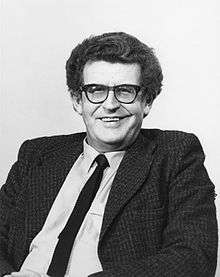Kenneth Minogue
Professor Kenneth Robert Minogue (11 September 1930 – 28 June 2013) was an Australian academic and political theorist. Long residing in the United Kingdom, Minogue was a prominent part of the intellectual life of British conservatism.
Kenneth Minogue | |
|---|---|
 Kenneth Minogue, c. 1980s | |
| Born | 11 September 1930 Palmerston North, New Zealand |
| Died | 28 June 2013 (aged 82) Guayaquil, Guayas Province, Ecuador |
| Known for | Professor of Political Science at the London School of Economics (1984–1995) |
Associated for much of his career with the London School of Economics, where he was Professor of Political Science from 1984 to 1995, he was described as a central figure in a group of prominent conservative philosophers and commentators at the LSE that included Maurice Cranston, Elie Kedourie, and William Letwin.[1]
Biography
Minogue was born on 11 September 1930 in Palmerston North, New Zealand.[1] He was educated in Australia, attending Sydney Boys High School and the University of Sydney.[1] Graduating with a Bachelor of Arts degree in 1950, his time there was influenced by John Anderson, who had built up a reputation on campus for his firm belief in free speech, secularism, and anti-communism.[2] Minogue was involved in student journalism – which he admitted was to the detriment of his studies – and wrote for Honi Soit and a short-lived free-thinking broadsheet, Heresy.[2] Friends included Murray Sayle and Peter Coleman.[2]
Deciding to move to England, Minogue made his way there by working as a cabin boy on a ship bound for London via Odessa and Port Said, and, once arrived, soon found himself lodging at a hostel in Russell Square.[2] After a brief stint as a freelance writer, he found steadier income by working as a supply teacher with the London Education Authority for eighteen months.[2] Turned down for a masters degree at the LSE, he instead enrolled for a second undergraduate evening school course in Economics at the same institution. Following graduation he spent a year teaching at the University of Exeter, and returned to the LSE as assistant lecturer in 1956 at the invitation of Michael Oakeshott, where he would spend the rest of his academic life.[2]
Career
Minogue wrote academic essays and books on a great range of problems in political theory. He first came to public attention with his 1961 book The Liberal Mind, which criticised the 'drift' toward collectivism and progressivism in Britain's post-war consensus, which he believed acted as a 'prop to the mediocre' and deprived individuals of personal initiative.[3] A running theme in the book was Minogue's distate for the 'melodrama of oppressors and victims' that he saw as constituting liberal historiography.[2] Minogue, who described Liberalism as the first 'modern ideology', also reflected on what he argued was the second – Nationalism – in his 1967 book of the same name.[2] As far as Minogue was concerned, if the liberal view of history tended to the ahistorical, then nationalist ideology was guilty of reducing it to mythology.[2]
In 1986 Minogue presented a 6-part television program on Channel 4 about free market economics called The New Enlightenment. He was Senior Research Fellow with the Social Affairs Unit in London. He wrote a study on Maori-Pākehā relations (the latter is the Maori term for New Zealanders of European descent) for the New Zealand Business Roundtable which was published in 1998 published as Waitangi Morality Reality.[4]
From 1991 to 1993 Minogue was chairman of the euro-sceptic Bruges Group.[3] From 2000, he was a trustee of Civitas. He served as President of the Mont Pelerin Society from 2010.[3] In 2003, he received the Centenary Medal from the Australian government. He was also involved with the Centre for Policy Studies and the European Foundation.
Personal
He married firstly, Valerie Pearson Hallett, with whom he had a son and a daughter, in 1954. This marriage was dissolved in 2001.[1] Minogue was later married to Beverly Cohen, who predeceased him.[1] According to Roger Kimball, the two often hosted dinner parties at their London home.[5] He was reportedly a member of the Garrick Club and a keen tennis fan.[5][3]
Death
Minogue died, aged 82, in Guayaquil, Ecuador, after apparently suffering cardiac arrest on a flight returning from San Cristóbal Island in the Galapagos, where he had been hosting a meeting of the Mont Pelerin Society, and was declared dead shortly after his plane landed on the Ecuadorian mainland.[5]
On Minogue's legacy, Roger Scruton suggested that Minogue was "no mere academic" but "a model of the conservative activist" because "he was in the business of defending old-fashioned civility against ideological rage, and he believed this was the real meaning of the freedom that the English-speaking peoples have created and enjoyed."[6]
Bibliography
- The Liberal Mind (1963)
- Nationalism (1967)
- The Concept of a University (1974)
- Contemporary Political Philosophers (1976)
- Alien Powers: The Pure Theory of Ideology (1985)
- Thatcherism: Personality and Politics (ed, 1987)
- Politics: A Very Short Introduction (1995)
- Conservative Realism: New Essays in Conservatism (ed, 1996)
- The Silencing of Society (1997)
- Waitangi: Morality and Reality (1998)
- The Servile Mind: How Democracy Erodes the Moral Life (2010)
References
- "Professor Kenneth Minogue". The Daily Telegraph. 2 July 2013. Retrieved 18 May 2020.
- David Martin Jones (1 September 2013). "The Conservative Mind of Kenneth Minogue". Quadrant. Retrieved 18 May 2020.
- "Kenneth Minogue". The Times. 3 July 2013. Retrieved 18 May 2020.
- Kenneth Minogue Waitangi, Morality Reality Archived 18 February 2013 at the Wayback Machine, Wellington: New Zealand Business Roundtable, 1998
- Kimball, Roger (30 June 2013). "Kenneth Minogue, 1930–2013". PJ Media. Retrieved 18 May 2020.
- Scruton, Roger. "No Mere Academic". spectator.org. The American Spectator. Retrieved 22 February 2015.
External links
| Wikiquote has quotations related to: Kenneth Minogue |